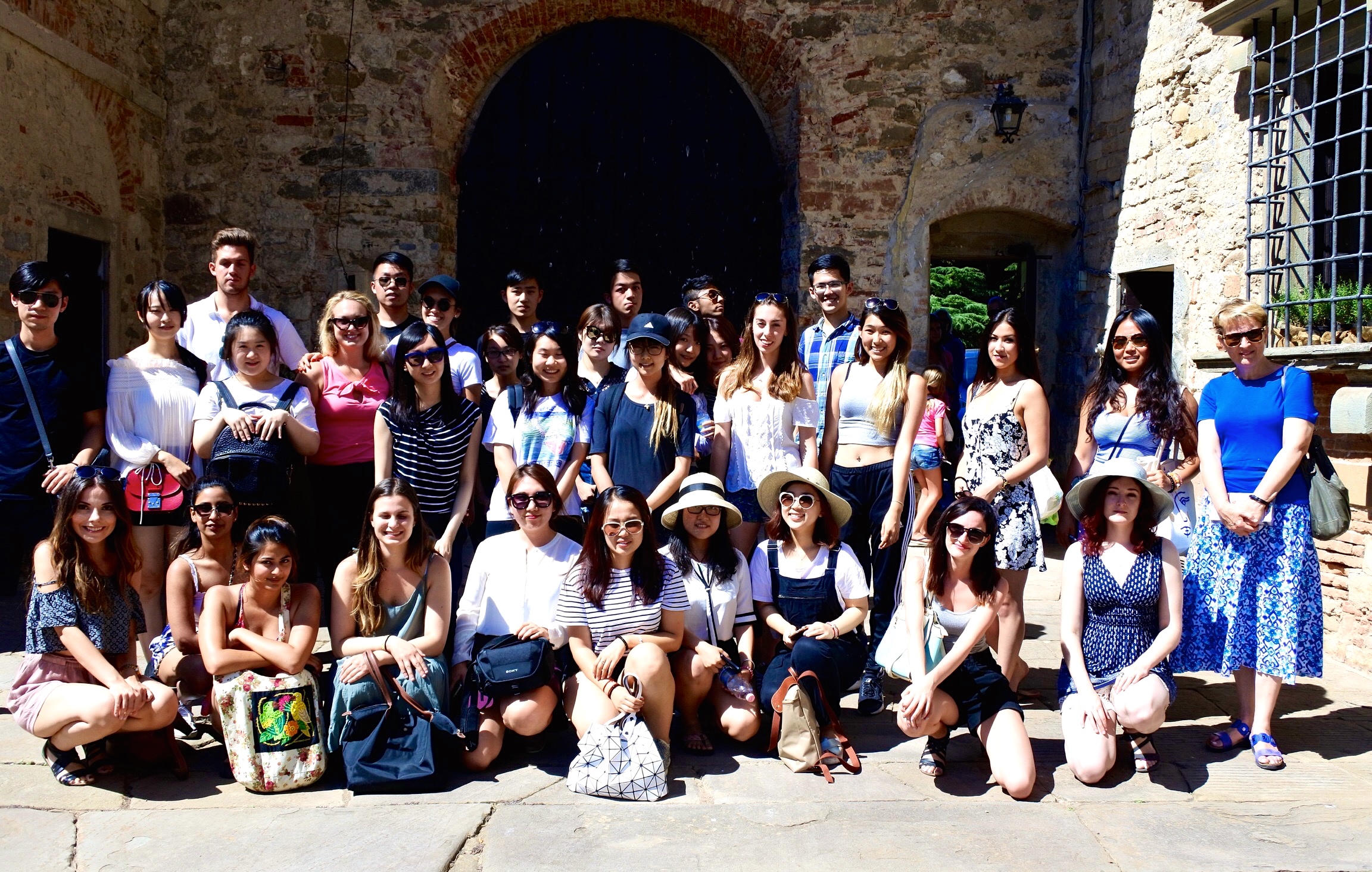
A Conversation with Summer Abroad Professors: Building Meaningful Connections
By Mauricio
Every Summer Abroad course is taught by a passionate U of T professor who is enthusiastic to be traveling and learning in a new country. Traditional classes at U of T can have hundreds of students, which can make it difficult to get to know your professors. Summer Abroad’s small class sizes, however, provide a unique environment where instructors and students interact closely almost every single day through classes, field trips, and even meals. Through all of these close interactions, students are able to build stronger connections with their instructors than they would in a regular classroom. These relationships are invaluable as students seek career advice, research opportunities, and reference letters. When I went to Singapore last June, I was fortunate to have many insightful conversations with my two professors, Dr. Weiguo Zhang and Dr. A. Ka Tat Tsang. Through my many conversations with them inside and outside of the classroom, I not only gained a better sense of the course material, but they also helped shape my plans for after I graduate.
To learn more about the value of building these connections, I had the chance to talk with two Summer Abroad instructors to hear how they connect with their students in the summer.
Professor Anne Urbancic has been a part of Summer Abroad since 1986, during which she has taught various classes on Italian language, culture, and food. She currently teaches ANT396Y0 Italian Regional Foodways and Culture in Siena, Italy.
Professor William Watson teaches CRI389Y0 Topics in Criminology: Rights, Freedoms and Responsibilities in Criminal Law: Historical Origins and New Directions in England and Canada, which he has taught since 2007 in Oxford, England.
Can you tell me about a memorable moment with your students?
Professor Urbancic: There are so many, I really scratched my head over this. I have to say that one of my favourite parts of last year, and for the past few years actually, is how the students come together. We go to so many places. The days are hot, and sometimes we have to walk a lot. But the students are always very kind and patient. We laugh and see so much, which all goes into building memories. And among those memories are when we cook a full Italian dinner from scratch. There are people who have never cooked in their lives and there are people who are trained chefs. So, all of these people come together with their strengths, their talents, and their good humor. Those are the really good memories. I have very, very good memories of Siena. You can tell because, otherwise, I wouldn't have gone so many times.
Professor Watson: Well, this is not a usual memory, but people got COVID, including me. So my meaningful memory is how well everyone coped with that, how well the situation was managed, how everybody was able to keep up with their work, and how we managed to quickly organize some online lectures and speakers. That really reflects the way Summer Abroad works. It’s a very cooperative, collective effort to make everything work as well as possible. We dealt with it perfectly well, and I think all the students did a great job.
From your experience in Summer Abroad, how do you understand the value of students building connections with their professors?
Professor Urbancic: Well, first of all, Summer Abroad really gives you an opportunity to push yourself into spaces that you are not normally in. It's a different country, it’s different food, and it’s different classrooms. It ends up being a totally different style of teaching, so the students and the professors are enjoying and learning from these things together. It pushes us out of our normal, very prescribed areas into new adventures. And because the professor is going through those as well, you can share those adventures. You can talk to your professor and approach them not only for the academic stuff, but also to share cultural insights into something that you've seen. It's much easier when you're in Summer Abroad.
Professor Watson: My teaching practice has always involved trying to maximize the amount that students can engage with the instructor. I’ve always thought it’s important. It's much easier to facilitate that connection at Summer Abroad than it is in a regular classroom. You're seeing the students almost every day. They're seeing you in class while they get to know each other. I think that the students getting to know each other is also part of them being able to connect with the instructor because it just creates a very different atmosphere. I would say that for many students, Summer Abroad is a unique experience of being able to spend a lot of time talking about their work with the professor. They have a much closer working relationship with their instructors, so it ends up being a very special experience for both the students and the instructor. I've written references for quite a few of my students because I get to know them and their work so well. It’s a unique opportunity to work with your instructor much more closely than you normally would.
What are some of the best ways students can build relationships with their Summer Abroad professors?
Professor Urbancic: If they're shy, they should meet other students. And then two of them can come and approach the professor because the professor will be there. The professor is there for them. Talk to the professor and say hello when you meet the professor outside of the tours or outside of the classroom. And one very, very important thing: you are in a situation where you are taking a course that is made for that place, so share with your professor and share with the other students what you have found and what you've learned.
Professor Watson: I've always advised students to just go to see their professors. Most students have got something that they can go to office hours about. Do that so that your professors have some chance of knowing who you are. It is completely the norm in Summer Abroad. You're seeing them all day, every day, sometimes all day, sometimes on visits, sometimes even in social events in the evening. The opportunity to actually have a professor know who you are, know something about you, and have spoken to you is enormous. All of that builds a different kind of relationship, which is especially relevant to reference writing.
What advice would you give to students who are unsure or hesitant about getting to know their professors?
Professor Urbancic: Professors are people, they love to talk to you. They're there because they want to share their knowledge and expertise. They want to share their enthusiasm about the subject that they're teaching. You don't go to teach in Summer Abroad if you're not enthusiastic about your subject, so talk to your professors. They're very, very happy to share with you. What I always say to my students is if you don't ask me questions, then I can just go home and do whatever I want and then I don't need to have this job. But ask me questions because we'll all find out different things from the answers.
Professor Watson: All of us who do this, particularly the ones who've done it before, we love Summer Abroad. We love doing it. We must be the professors who already like interacting with students and we like the teaching experience. Pretty much all of us look forward to it and not many people are going to sign up for summer abroad who don't basically like students. If students go on Summer Abroad and they've not been very good at talking to professors, then they get a bit more used to it while they’re traveling so that when they come back to the university, they'll find it a bit easier. I know some students find it daunting and think that instructors don't want to be bothered with them. That's generally not very true, but it's certainly not true on Summer Abroad.
To end on a light note, what are looking forward to most this summer?
Professor Urbancic: I love Siena and I love teaching in Siena, and I think that Summer Abroad has done an incredible job of organizing it. So I'm really looking forward to having a summer that is different, but in many ways also the same.
Professor Watson: I'm looking forward to what I'm always looking forward to, which is meeting a great new bunch of students. Most of the students will be people I've never met before. Many of them are not criminology students. It's as I think most Summer Abroad teachers will tell you, it is really the most fulfilling teaching experience we have at the university. I look forward to it every year. There'll be a whole new bunch of students I've never met before, and by the end of the four weeks, I'll know quite a lot about them, they'll know me, and we'll have all worked together. It will be great.
Thank you to Professor Urbancic and Professor Watson! Our sincere appreciation for providing insights as a Summer Abroad instructor!